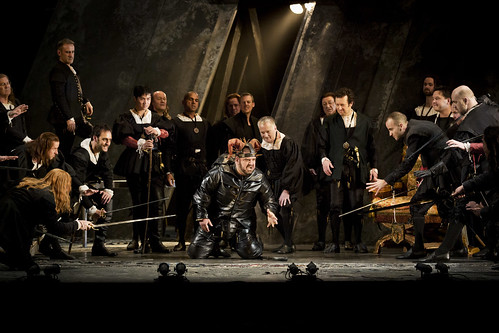Michael Kupfer-Radecky Hans Sachs
Stefan Vinke Walther von Stolzing
Natalie Aroyan Eva
Warwick Fyfe Sixtus Beckmesser
Opera Australia Chorus
Orchestra Victoria
Kasper Holten director
Pietari Inkinen conductor
State Theatre, Melbourne November 2018
**************
What a pleasure to be back in the State Theatre with its glorious curtain, troubling acoustic echo, and a most satisfying production of Wagner's Meistersinger.
Seen by Wagner as a pair to his Tannhauser, both feature singing competitions with Die Meistersinger receiving extra lashings of German pride and nationalism. The conclusion where Hans Sach (up until that point a sympathetic character) warns all and sundry of the dangers of nasty foreigners jars and the production tried to carve it out by flooding the stage in harshly cold lighting at that point. Was the idea that it was not really part of the rest of the opera? That we could leave it to one side?
The set was a monumental marble construction with traditional liveryman garb for the Mastersinger members. Walther's biker look seemed a bit odd but he is meant to be the outsider, albeit an aristocractic one.
The production was well sung across the board, with Warwick Fyfe's Beckmesser strong in voice and characterisation, and Michael Kupfer-Radecky projecting humanity and doubt as Hans Sachs wrestles with his demons. It's coup de theatre came at the end with a roundly annoyed Eva storming off stage as Walther (who had promised to run away with her) is convinced to join the mastersingers men's club and respect German tradition.
This was at the end of the glorious 2 hour Third Act, which takes off to a whole other level of musical quality after Acts 1 and 2. One among so many examples of Wagner's overwhelming artistic genius.
 |
| Eva before Walther fails her |
 |
| The State Theatre's curtain |







